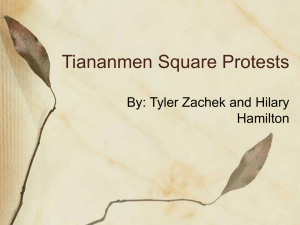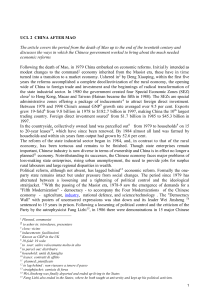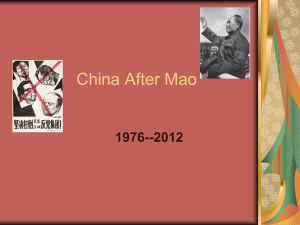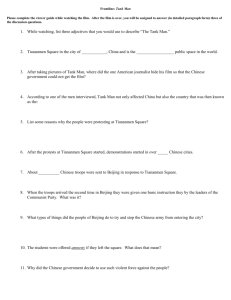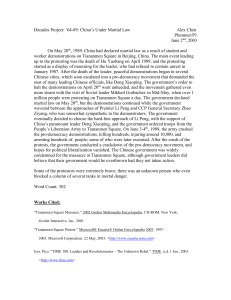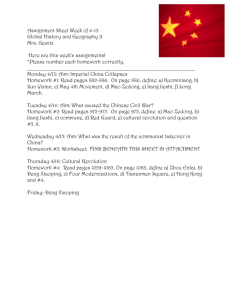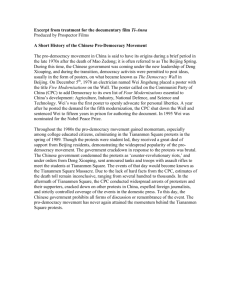1989 A Critical Turning Point in Chinese History
advertisement
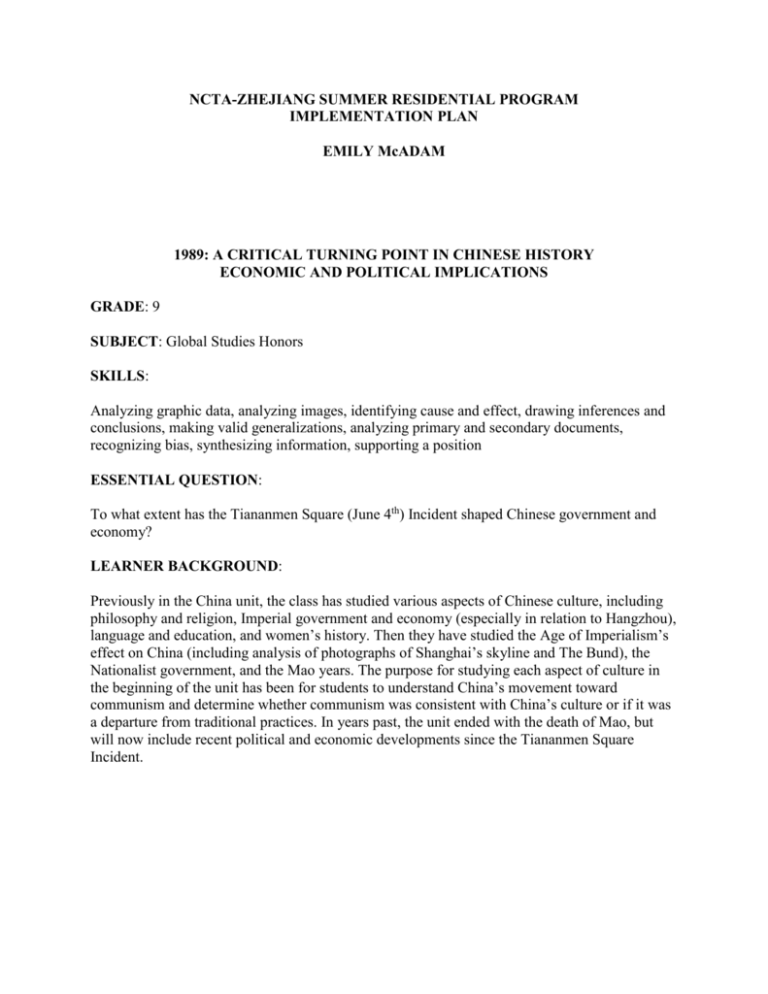
NCTA-ZHEJIANG SUMMER RESIDENTIAL PROGRAM IMPLEMENTATION PLAN EMILY McADAM 1989: A CRITICAL TURNING POINT IN CHINESE HISTORY ECONOMIC AND POLITICAL IMPLICATIONS GRADE: 9 SUBJECT: Global Studies Honors SKILLS: Analyzing graphic data, analyzing images, identifying cause and effect, drawing inferences and conclusions, making valid generalizations, analyzing primary and secondary documents, recognizing bias, synthesizing information, supporting a position ESSENTIAL QUESTION: To what extent has the Tiananmen Square (June 4th) Incident shaped Chinese government and economy? LEARNER BACKGROUND: Previously in the China unit, the class has studied various aspects of Chinese culture, including philosophy and religion, Imperial government and economy (especially in relation to Hangzhou), language and education, and women’s history. Then they have studied the Age of Imperialism’s effect on China (including analysis of photographs of Shanghai’s skyline and The Bund), the Nationalist government, and the Mao years. The purpose for studying each aspect of culture in the beginning of the unit has been for students to understand China’s movement toward communism and determine whether communism was consistent with China’s culture or if it was a departure from traditional practices. In years past, the unit ended with the death of Mao, but will now include recent political and economic developments since the Tiananmen Square Incident. LESSON 1: TANK MAN Duration: Two 80-minute blocks Objective: Students will analyze the famous Tank Man photograph and view the PBS documentary in order to evaluate the extent of the changes that 1989 ushered in. Materials and Resources: Tiananmen photograph The Tank Man DVD or access to computer lab to watch online The Tank Man question sheet Internet access and Tank Man Analysis worksheet for homework Activities: Students brainstorm the possible context of the photograph based on what they already know about China and what they can see in the picture. Students view Frontline: The Tank Man and answer comprehension questions. For homework, students complete “Tank Man Analysis” assignment. Major Understandings: Chinese citizens challenged the government for political rights as they had only sporadically throughout history, but the government brutally put down these protests. LESSON 1: Tank Man Questions Name: _____________________________ View Frontline: The Tank Man by following this link and clicking on “watch the full program online.” Type your answers to the questions below in complete sentences, using specific examples from the video for support. 1. How did “Tank Man” change the world? Why is he such an inspiration to the world? 2. How does the Chinese government control civilian lives? 3. How did the media play a significant role in the Tiananmen Square massacre? 4. Who, do you believe, is to blame for the massacre at Tiananmen Square? Why? 5. What is the difference between China “A” and China “B?” 6. Explain how migrant workers are treated in modern China. 7. How are foreign companies helping the Chinese government censor information? 8. What do you think happened to “Tank Man?” What makes you think this? Do you think “Tank Man” needs a name? Why or why not? 9. Identify at least two positive consequences for China that developed as a result of the Tiananmen Square incident. Be sure to explain why they are positive for China. 10. Identify at least two negative consequences for China that developed as a result of the Tiananmen Square incident. Be sure to explain why they are negative for China. LESSON 1: Tank Man Analysis Name: _____________________________ Directions: Examine some sections of the Frontline: The Tank Man website (Memory of Tiananmen, Analysis, and Interviews) as well as other internet sources and cite evidence to answer the following questions: What does the Tank Man Incident reveal about the Chinese people? About the Chinese government? What implications might this have had for China? __________________________________________________________ __________________________________________________________ __________________________________________________________ __________________________________________________________ __________________________________________________________ __________________________________________________________ __________________________________________________________ __________________________________________________________ __________________________________________________________ __________________________________________________________ __________________________________________________________ __________________________________________________________ __________________________________________________________ __________________________________________________________ __________________________________________________________ __________________________________________________________ __________________________________________________________ __________________________________________________________ __________________________________________________________ __________________________________________________________ __________________________________________________________ __________________________________________________________ __________________________________________________________ __________________________________________________________ __________________________________________________________ __________________________________________________________ __________________________________________________________ __________________________________________________________ LESSON 2: EFFECTS OF TIANANMEN Duration: One 80-minute block Objective: Students will analyze Deng Xiaoping’s policies and determine the effectiveness of his “deal” after Tiananmen. Materials and Resources: “The Intensification of Reform,” Deng Xiaoping’s Southern Tour Speech, 1992, rpt. in Through Chinese Eyes, Vernoff and Seybolt, eds. “Deng Xiaoping’s Centenary Celebrated,” China Daily, 23 Aug 2004 “How China is Ruled,” BBC News “Deng Xiaoping’s Deal” worksheet. Activities: Students compare and contrast Mao’s economic policies with Deng Xiaoping’s and predict the effectiveness of the Responsibility System. Students examine parts of “How China is Ruled” on the Smartboard, laptops, or iphones. Students discuss whether they think the Tank Man, the Tiananmen protestors, and their supporters were satisfied with Deng Xiaoping’s “deal.” Were their goals met? For homework, students find artifacts representing both China A and China B (photographs, articles, etc). Major Understandings: The Chinese government made some concessions in the aftermath of June 4th, for better or for worse. Many people, but certainly not all, benefitted from the economic changes. LESSON 2: Deng Xiaoping’s Deal Name(s): ___________________________ The Tank Man describes the “deal” that Deng Xiaoping made in the aftermath of June 4th: Orville Schell says: “This was Deng Xiaoping's great moment of genius. After the massacre of 1989, he, in effect, said, ‘We will not stop economic reform. We will, in effect, halt political reform.’ What he basically said to people was, ‘Folks, you're in a room. There are two doors. One door says politics, one door says economics. If you open the economic door, you're on your own. You can go the full distance, do basically whatever you want, get wealthy, help your family, have a bright future, move forward into a glorious future. If you open the political door, you're going to run right into one obstruction after another, and you're going to run into the state.’ ” Robin Munro continues: “There was a point to that. This was meant to buy the Communist Party a new lease on life - on the one hand, intimidate opposition for a generation, on the other hand, give the people bread and circuses. And the deal is there must be no challenge to one-party rule. That's the terms of today's China. That's the deal.” Read and analyze Deng Xiaoping’s Southern Tour Speech and “Deng Xiaoping’s Centenary Celebrated, followed by “How China is Ruled” on the Smartboard or a personal electronic device. Answer the questions below in whatever format works for you, but be sure to cite the sources from which you have drawn your conclusions. 1) Compare and contrast Mao’s economic policies with Deng Xiaoping’s. 2) How effective would you expect the Responsibility System to be? 3) Do you think the Tank Man, the Tiananmen protestors, and their supporters were satisfied with Deng Xiaoping’s “deal”? Were their goals met? LESSON 3: CHINA’S ECONOMY Duration: One 80-minute block Objective: Students will identify hallmarks of the growing Chinese economy, especially in the cities, and determine reasons for its growth. Materials and Resources: Computer lab or laptops Photographs from Hangzhou’s New Business District “Postcards from the Future: The 75 Most Dynamic Cities of 2025,” Foreign Policy, 13 Aug 2012. “China Economic Reform Timeline,” Center for Strategic and International Studies “China’s Economy” worksheet “Bourgeois and Socialist Democracies Compared,” People’s Daily, March 1990, rpt. in Chinese Civilization: a Sourcebook, Patricia Buckley Ebrey, ed., pp. 501-504. Activities: Students share their China A and China B findings with the class and explain the connection to the post-Tiananmen reforms. Students research Chinese cities in “Postcards from the Future,” analyze the graphic data of the cities, cross-reference with the economic reform timeline, and hand in worksheet. For homework, students analyze “Bourgeois and Socialist Democracies Compared” and identify its bias as well as the perspective of the Western democracies to which it responds. Major Understandings: China’s economy is growing in a large part to government direction, which began before the Tiananmen Incident and increased after it. LESSON 3: China’s Economy Name(s): ___________________________ Research the economies of Chinese cities compared to other growing cities in the world on “Postcards from the Future.” Be sure to consider the graphic data linked here. Then, familiarize yourselves with the “Economic Reform Timeline.” Below, explain as many reasons as possible for why China has experienced this economic growth. LESSON 4: CONTROL OF INFORMATION & POST-TIANANMEN PROTEST Duration: One 80-minute block Objective: Students will evaluate the effectiveness of the Communist Party’s control of information. Materials and Resources: Computer lab or laptops “ ‘Nail House’ in Chongqing Demolished,” China Daily, 3 Apr 2007. “ ‘Hide and Seek’ Jail Death Sparks Outrage, 22 Feb 2009. Michael Wines, “A Dirty Pun Tweaks China’s Online Censors,” NY Times, 11 Mar 2009. “Green Dam Girl,” Know Your Meme, 2009. “Control of Information and Protest” presentation worksheet Activities: Discussion of New Media/the Internet in China adapted from Dr. Lu Wei, Professor of Cummunication, Zhejiang University Each group of 3 students researches an example of Chinese protest against the government’s control of information and presents findings to the class. For homework, students prepare for the Socratic Seminar. In addition to documents from the unit, they draw from documents in Part V: The Era of Reform of Through Chinese Eyes, especially “The Call for Change,” “Manifestations of Discontent,” The Tiananmen Crisis,” “Wealth and Consumerism,” “Problems of the City and the Countryside,” “The Private Economy,” and “Human Rights.” Major Understandings: Since the Tiananmen Massacre, the Chinese people use the internet to protest, even as the government tries to censor it. LESSON 4: Control of Information and Protest Name(s): ___________________________ Work with your partners to research your example of protest of the Chinese government’s control of information. Prepare a report to the class on the following: Your example: In what ways did the government attempt to control information? What did Chinese citizens do about it? What was the result? LESSON 5: SOCRATIC SEMINAR Duration: One 80-minute block Objective: Students will support gray-area positions while debating answers to the essential question. Materials and Resources: Socratic Seminar Self-Assessment sheet China Reflection sheet Activities: Students form a circle and lead their own seminar aimed at discussing and debating the essential question; one student begins with a question or comment, others who have a response raise their hands, the first speaker calls on the next, and so on, with little to no direction from the teacher, who sits outside the circle. Students complete the Socratic Seminar Self-Assessment and turn it in with evidence of their seminar preparation. For homework, students complete the final reflection of the unit: What does it mean to be Chinese? Major Understandings: The government’s response to the Tiananmen Square (June 4th) Incident brought about major economic changes, but China has also followed its traditional culture in several areas. The impact of ’89 is “gray” rather than “black and white”; it produced huge economic changes, quelled overt political challenges to the government, and increased free expression and access to information, though still sometimes limited. LESSON 5: Socratic Seminar Self-Assessment Name: _____________________________ Seminar Topic: To what extent has the Tiananmen Square (June 4th) Incident shaped Chinese government and economy? Reflection: Be sure to address each question thoroughly and thoughtfully. 1. What was your preparation for this discussion? Was this preparation effective? What evidence from the discussion supports your conclusions about your preparation? How would you prepare differently for the next discussion? __________________________________________________________ __________________________________________________________ __________________________________________________________ __________________________________________________________ __________________________________________________________ __________________________________________________________ __________________________________________________________ __________________________________________________________ __________________________________________________________ __________________________________________________________ __________________________________________________________ 2. What skills in the discussion do you think you need to improve? Why? How will you work to improve these skills? __________________________________________________________ __________________________________________________________ __________________________________________________________ __________________________________________________________ __________________________________________________________ __________________________________________________________ __________________________________________________________ __________________________________________________________ __________________________________________________________ __________________________________________________________ __________________________________________________________ Assessment: Use the rubric below to score your own performance. You must include evidence (notes or examples) to support your score for each column. Use the space below the rubric to justify/explain your scores and your evidence. Score 5 Your support Student states an opinion and supports with meaningful and substantial textual evidence Your content knowledge Substantial knowledge and understanding of various sources of information on many levels (including outside sources) 4 Student proposes new idea that moves discussion in a new and interesting direction Thoroughly understands content; depth of understanding is clear but not substantial 3 Student makes a presumption based on some evidence but may lack substantive evidence Understands and refers to information with generalizations 2 Student transfers a concept from another classmate or from the text with a new but limited perspective Student repeats a concept from another classmate or from the reading Seems to have some understanding of content, but comments support a lack of any depth of understanding Apparent misunderstanding or neglect of text 0-1 Your participation Speaks as often as possible during the seminar; or comments build off or challenge previous comment without repetition of ideas; or posture, demeanor, and behavior clearly demonstrate respect and attentiveness to others. Speaks frequently during the seminar; or comments are related to previous comment to show only agreement or disagreement; or listens to others most of the time, does not stay focused on other's comments (too busy formulating own) or loses continuity of discussion. Speaks occasionally during the seminar; or shows some consistency in responding to the comments of others; or listens to others some of the time, does not stay focused on other's comments (too busy formulating own) or loses continuity of discussion. Speaks once during the seminar; or drifts in and out of discussion, listening to some remarks while clearly missing or ignoring others. Does not speak during the seminar; or disrespectful of others when they are speaking; or behavior indicates total noninvolvement with group or discussion. Your justifications (also attach evidence): __________________________________________________________ __________________________________________________________ __________________________________________________________ __________________________________________________________ __________________________________________________________ __________________________________________________________ Teacher’s comments: Score: /15 LESSON 5: China Reflection Name: _____________________________ Review your materials from the China unit and respond to the following question. Wherever possible, indicate from which documents you have drawn your conclusions. What does it mean to be Chinese? __________________________________________________________ __________________________________________________________ __________________________________________________________ __________________________________________________________ __________________________________________________________ __________________________________________________________ __________________________________________________________ __________________________________________________________ __________________________________________________________ __________________________________________________________ __________________________________________________________ __________________________________________________________ __________________________________________________________ __________________________________________________________ __________________________________________________________ __________________________________________________________ __________________________________________________________ __________________________________________________________ __________________________________________________________ __________________________________________________________ __________________________________________________________ __________________________________________________________ __________________________________________________________ __________________________________________________________ __________________________________________________________ __________________________________________________________ __________________________________________________________ __________________________________________________________ __________________________________________________________
